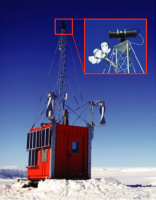1. Long-term photographic recordings of animal populations provide unique insights
into ecological and evolutionary processes. However, image acquisition at remote
locations under harsh climatic conditions is highly challenging.
2. We present a robust, energetically self-sufficient and remote-controlled observatory
designed to operate year-round in the Antarctic at temperatures below −50°C
and wind speeds above 150 km/h. The observatory is equipped with multiple overview
cameras and a high resolution steerable camera with a telephoto lens for capturing
images with high spatial and temporal resolution.
3. Our observatory has been in operation since 2013 to investigate an emperor penguin
(Aptenodytes forsteri) colony at Atka Bay near the German Neumayer III research
station. Data recorded by this observatory give novel biological insights in
animal life cycle and demographic trends, but also in collective and individual behaviour.
As an example, we present data showing how wind speed and direction
influence movements of the entire colony and of individual penguins. We also estimate
daily fluctuations in the total number of individuals present at the breeding
site.
4. Our results demonstrate that remote-controlled observation systems can bridge
the gap between remote sensing, simple time-lapse recording setups, and on-site
observations by human investigators to collect unique biological datasets of undisturbed
animal populations.
Read the full article in Methods in Ecology and Evolution


